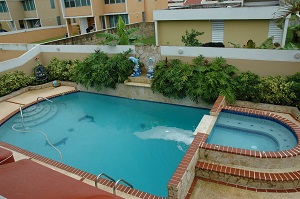 While I don’t have a pool a few neighbors do. I’m sure a few have hot tubs too… rough life, I know. In fact, as I write this I’m sitting pool-side watching my kids swim at a neighbor’s pool because they’re more than nice enough to allow us that privilege on such hot summer days. But, while my kids are splashing around having mindless fun, I’m thinking about the pool as a source of water should be need ever arise. After all, there are many thousands of gallons of useful water just sitting there!
While I don’t have a pool a few neighbors do. I’m sure a few have hot tubs too… rough life, I know. In fact, as I write this I’m sitting pool-side watching my kids swim at a neighbor’s pool because they’re more than nice enough to allow us that privilege on such hot summer days. But, while my kids are splashing around having mindless fun, I’m thinking about the pool as a source of water should be need ever arise. After all, there are many thousands of gallons of useful water just sitting there!
The question really is whether or not this water can truly be relied upon as a source of water should the grid stop functioning for any length of time?
Well, the first problem you have is simply whether or not any large standing body of water–be it a pool or hot tub primarily–will actually be there when you need it most. That is, could the pool have been damaged and developed a crack that then allows all (or most) of the water to drain away. Major disasters like an earthquake could certainly cause this whereas smaller catastrophes such as a fallen tree from a significant windstorm could do the same.
The next problem is whether or not that pool water is actually usable as a source of clean, potable, water. Your first reaction might be “sure it is, I drink it whether I want to or not whenever I go swimming and haven’t died yet!” So, yes, the start of this answer is that it could be used as a source of potable water… sort of.
Unfortunately, a pool is still open to the environment and can be subject to anything that might float through the air, from natural contaminants such as pollens to man-made chemicals. You also have the problem of whatever rodents might drop in the pool and especially the occasional bird droppings… yuk! Of course, so long as your pool is properly chlorinated and the mechanics are actively functioning to clean the pool then these are of lesser concern, in my opinion.
A possible problem that may be of concern over the long term is that of constantly ingesting water that is always chlorinated. People with weak immune systems or perhaps pregnant women would be more at risk, or so they say. Personally, I wouldn’t want to ingest a lot of chlorinated water regardless–hence, why I don’t chlorinate my stored water but instead choose to use a quality gravity filter–but if it doesn’t bother you too much then maybe chlorination isn’t that big of a concern either. Of course, I’ve also read that the common swimming pool is less chlorinated than tap water so maybe it’s not a big deal after all.
I have heard, however, that once the active chlorination process that keeps the pool water properly chlorinated stops then that chlorine dissipates into the atmosphere rather quickly, say within a few days. This could either be a really good thing if you don’t want to ingest chlorinated water or really bad if you’re now weeks into a disaster scenario and you’re happily ingesting pool water that you THINK is well-chlorinated–and therefore safe to drink–but really is not.
Either way, so long as this water hasn’t been lost for some reason then you can surely use it for non-consumption reasons, including doing the dishes, washing clothes, maybe even bathing if you’re careful not to ingest any. I wouldn’t see much harm in using it to water the garden or for any other reason where greywater would be useful.
Ultimately, I would say that you can certainly use your pool or spa water for an emergency so long as you understand that (1) it might not be as clean as you thought and (2) it might not be there post-disaster. In my opinion, consider pools and spas as a “bonus” source of water and not something to rely upon. Instead, ensure you have plenty of water properly stored in either large water drums (e.g., 55-gallon water barrels) or 257+ gallon IBC totes. Consider a minimum of one 55-gallon drum per family member as a start. Obviously, it’s hard to have too much water so if you can store more then please do so.

Leave a Reply